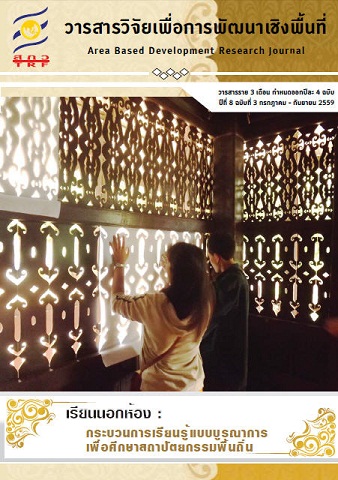รูปแบบการพัฒนาศักยภาพชุมชนสำหรับการใช้ระบบผลิตกระแสไฟฟ้าพลังงานแสงอาทิตย์ กรณศึกษา: ชุมชนแม่สลองใน จังหวัดเชียงราย
Main Article Content
Abstract
บทคัดย่อไม่สมบูรณ์
Model of community potential development of Solar Home System Case study: Mae Salong Nai Community, Chiang Rai Provice
This paper presents model of community potential development of solar home system, case study: Mae Salong Nai community, Chiang Rai province. The data were collected by using participatory action research, qualitative, quantitative and operations research methodology. The basic solution analysis using descriptive statistic and analytic hierarchy process is made and training document set is used as tool for knowledge transferring to the community.
This study result was found that the main problem was SHS usage of community, especially the decreased efficiency of SHS operation because of the deteriorated electrical equipment and battery. The experts indicated that sustainability factor in terms of community????s SHS technical/ knowledge could help develop community’s potential by using training method on system operation and maintenance. The training document set is made through five processes as follows: study of SHS operation, problem-based learning of SHS, community knowledge transfer, knowledge development for community and evaluation and conclusion of trainee. After training, the results showed that the participant’s knowledge about SHS usage increased significantly at 0.05 and training program had the efficiency value at E1/E2 equal to 47.50/80.83.This study can be used to apply with other renewable energy projects with consideration in terms of social context, geography and time of model application.
Article Details
Area Based Development Research Journal values copyright protection and licensing to safeguard author rights and facilitate the appropriate dissemination of research. Our policies ensure openness, accessibility, and attribution. Authors retain copyright ownership, and articles are published under a Creative Commons Attribution License (CC BY), allowing sharing, adaptation, and proper attribution. Authors have the freedom to publish under the CC BY license, granting broad reuse and distribution permissions. The journal supports posting articles on third-party repositories, adhering to institutional and funding restrictions. Author guidelines detail copyright and licensing requirements, empowering authors with knowledge about their rights and responsibilities. These policies cultivate an environment of collaboration, openness, and responsible sharing, benefiting authors and the research community while honoring intellectual property rights.


